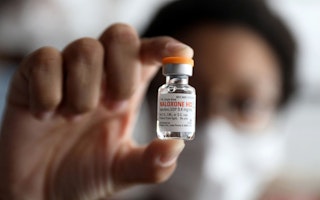Why Harm Reduction Is Crucial to the Fight Against HIV
By Fionnuala Murphy

Earlier this fall, an international team of researchers sounded a grim warning about the state of the global HIV epidemic among people who inject drugs. In two long-awaited research papers published in the Lancet, they laid out the evidence that not only is the scale of this epidemic worse than we thought, but that most countries are failing to provide the basic harm reduction interventions, like needle and syringe exchange programs and opioid substitution therapy, that are crucial to halting its spread.
In light of this evidence, world leaders and global agencies charged with leading the HIV response need to recognize that they can’t continue with business as usual. It’s time for them to call on governments to rethink their approach to drug policy and invest in harm reduction.
At Harm Reduction International, we’ve been tracking the global state of harm reduction since 2006, but the new data still surprised and alarmed us. The research shows that just one percent of the world’s people who inject drugs live in countries with widespread availability of two lifesaving harm reduction measures. Only 16 percent of them have access to opioid substitution therapy or medicines prescribed for opioid dependence—which is proven to significantly reduce transmission of HIV and hepatitis.
Meanwhile, harm reduction programs across the globe provide only a third of the number of sterile needles and syringes the World Health Organization deems necessary. The failure to invest in effective harm reduction measures has had a devastating effect. The new data suggests the UN has significantly underestimated the scope of the epidemic—the number of people who inject drugs who are living with HIV could be as high as 2.8 million worldwide, a huge leap from the 1.6 million figure currently used by UN agencies.
Although some of this gap may be the result of different research methods, it should still set alarm bells ringing.
By providing a global snapshot of the experiences of people who use drugs, these studies also hint at the reasons behind the shortcomings in the worldwide HIV response. For example, the second of the two papers estimates that a staggering 57.9 percent have a history of incarceration—proof that in far too many countries, there is always money for police raids and prisons, even as harm reduction services go unfunded. Governments continue to focus on drug control, even as the evidence mounts that the “war on drugs” has been a public health catastrophe.
Our 10 by 20 campaign offers a better path forward. We’re urging governments to redirect 10 percent of the vast resources they currently spend on drug control to harm reduction by the year 2020. Right now, the world spends $100 billion on drug law enforcement each year—and according to research we did with the Burnet Institute, spending just 7.5 percent of that amount on harm reduction instead could virtually end the HIV epidemic among people who inject drugs worldwide.
Nor are the benefits limited to HIV: effective harm reduction programs could also enable governments to get a grip on spiraling rates of viral hepatitis, prevent many of the fatal overdoses which are at crisis levels in many countries, and reduce drug-related homelessness and crime. Investing in harm reduction can actually help governments facing these crises save money. More importantly, it can help them save lives.
At Harm Reduction International, we work with a vibrant international network of harm reduction champions to argue for a shift towards drug policies that focus on public health and human rights—and we’ve shown that they can work. But the new evidence that’s emerged this fall shows we’re running out of time.
We need national governments to be brave enough to reject the war on drugs approach and invest in harm reduction instead. The leaders of the global HIV response can play a key role in persuading countries to take this leap. On December 1, World AIDS Day, we’re calling on them to recognize that we can’t talk about ending the HIV epidemic without talking about drug policy and putting harm reduction front and center.
Harm Reduction International is a grantee of the Open Society Foundations.
Fionnuala Murphy is head of advocacy at Harm Reduction International.

